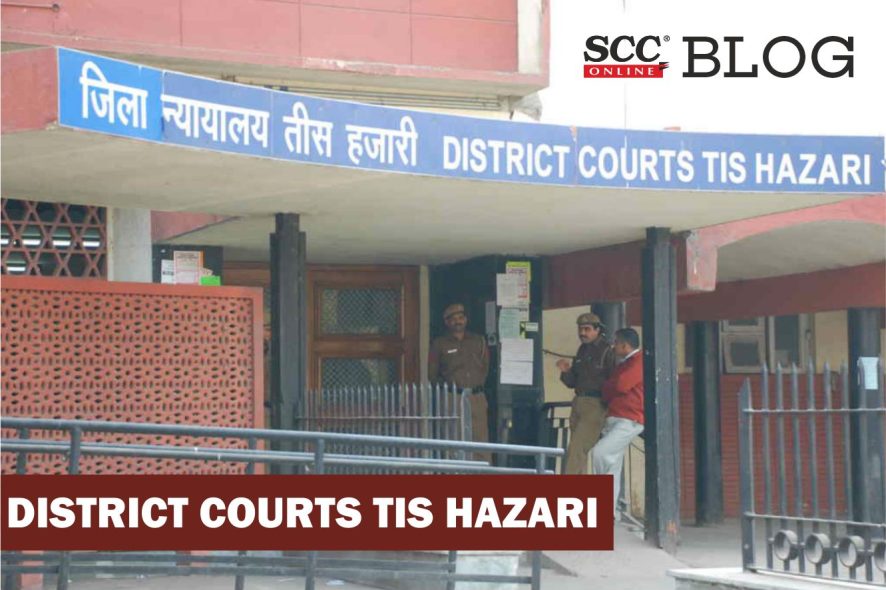Metropolitan Magistrate, West, Tis Hazari Courts, Dehi: In a case filed by the complainant-advocate claiming to be anguished due to the harm caused to his reputation by the actions of the accused, Devanshu Sajlan J., convicted the accused of the offence under Section 500 of Penal Code, 1860 (IPC).
The case of the complainant is that the accused filed a complaint against the complainant before the Bar Council of Delhi on 23-03-2007 levelling serious and defamatory allegations against him. The allegation which the complainant has alleged is as follows:
“Ashok Drall ne kaha ki mere to judges se bhi achhe sambandh hai main to murder case bhi lakh do lakh me nipatwa deta hu yeh to mamuli si bat hai. Mai Ashok Drall vai Neelam ki bataon mai aa gayi.”
Placing reliance on Kiran Bedi v. Committee of Inquiry, (1989) 1 SCC 494, Subramanian Swamy v. Union of India, (2016) 7 SCC 221 and Google India (P) Ltd. v. Visaka Industries, (2020) 4 SCC 162, the Court noted that there are two-fold ingredients of the offence of defamation to be met, which are as follows:
(i) An imputation must be made or published by the accused concerning the complainant
Placing reliance on Madhuri Mukund Chitnis v. Mukund Martand Chitnis, 1990 SCC OnLine Bom 410, the Court further noted that it is evident that publication includes pleadings, complaints, and affidavits made before a lawful authority. Therefore, the first ingredient (i.e., making/ publication of an imputation) of the offense of defamation stands proved in the present case.
(ii) Intention to cause harm to the reputation of the Complainant
The Court observed that the said ingredient is required to be read together with Explanation 4 to Section 499 IPC, which requires that the imputation, directly or indirectly, in the estimation of others, lowers the character or credit of that person or causes it to be believed that the person is in a loathsome or disgraceful state. Therefore, the onus on the complainant is to prove that
a. Accused had an intention/ knowledge/ reason to believe to cause harm to the reputation of the complainant
Placing reliance on John Thomas v. K. Jagadeesan (Dr), (2001) 6 SCC 30, the Court concluded that once a statement is held to be per se defamatory, the complainant is not required to prove loss to his reputation separately and he/ she stands discharged of the said burden.
b. Imputation made by the accused caused harm to the reputation of the complainant
The Court considered the content of the allegations and noted that the only possible meaning of the said statement is that the complainant has been projected as a person who claims to be a broker between judges and litigants for the purpose of facilitating bribery and is calculated to lower in the estimation of others the ethical character of the complainant as a lawyer.
Thus, the second ingredient also stands proved in the present case since the statement of the complainant is per se defamatory, the complainant is discharged of the burden to prove mens rea and harm to reputation.
On the defence taken by the accused that the present case is covered within the scope of Exception 8 to Section 499 IPC, the Court remarked that there is no absolute privilege or protection granted to complaints/ statements made to a lawful authority and is required to be proved that the said statement was made in good faith, the burden to prove which, lies on the accused in the present case and the accused has failed to establish the same, even on the scale of preponderance of probabilities.
Thus, the Court held that the accused must be convicted of the offence under Section 500 IPC and hearing regarding quantum of sentence to be heard separately.
[Ashok Drall v. Kanta Choudhary, 2022 SCC OnLine Dis Crt (Del) 47, decided on 27-10-2022]
Advocates who appeared in this case:
Complainant in person;
P.K. Sharma, Counsel for the accused.
*Arunima Bose, Editorial Assistant has reported this brief.






